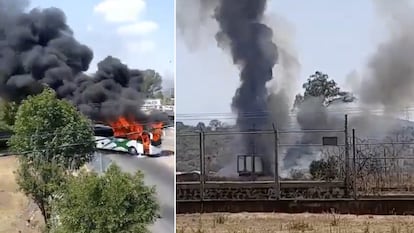Cartel violence erupts in Michoacán, Jalisco and Guanajuato in a new wave of attacks
The Jalisco New Generation Cartel is reacting to increasing pressure from the Mexican government, which has targeted high-ranking bosses and important logistics operators


The Jalisco New Generation Cartel (CJNG) is in revolt. The Mexican government has tightened its grip on the powerful criminal organization in recent weeks in Michoacán, Jalisco, and Guanajuato, a strategy aimed at weakening the CJNG’s strength through confrontations and the arrests of key logistics operators. The goal is to strike the cartel in its major strongholds and gradually suffocate it. The cartel, led by Nemesio Rubén Oseguera Cervantes, “El Mencho,” reacted Wednesday afternoon with roadblocks and by burning vehicles and businesses in the three states. El Mencho, the most wanted drug trafficker in the United States, is flexing his muscles on his home turf and demonstrating that his organization will sell its skin dearly.
Some local media outlets reported firefights between the armed forces and members of the CJNG, with the help of Los Viagras, an armed wing of La Familia Michoacana in Apatzingán, but official information is scarce or nonexistent at the time of writing. Sources familiar with the operation indicate that “federal elements arrested a high-ranking criminal leader,” triggering the blockades in that area. This is the CJNG’s standard modus operandi, one it previously employed in 2022 during a failed military operation to capture two of its leaders, Ricardo Ruiz, known as “El Doble R,” and Gerardo González, known as “El Apá.” At the moment, neither Alfredo Ramírez Bedolla, nor Pablo Lemus, nor Libia Dennise, governors of Michoacán, Jalisco, and Guanajuato, respectively, have commented on the matter. Neither has President Claudia Sheinbaum, nor any of the three state prosecutors’ offices.
The attacks, which have so far resulted in no casualties or arrests, have primarily targeted federal highways, the country’s busiest thoroughfares. The CJNG has turned trucks and private vehicles into makeshift burning barricades. The state of Michoacán has been the hardest hit, with blockades in a dozen municipalities in its rural areas, where there is a strong National Guard and army presence. At least two Oxxo stores were also set ablaze in Apatzingán.
The cartel violence has spread at a lesser rate to the Guanajuato region bordering Michoacán, with burning trailers blocking highways connecting the municipalities of La Piedad, Pénjamo, Abasolo, and San Gregorio, according to the State Public Security Secretariat. Another burning truck shut down traffic on the highway between Irapuato and Zapotlanejo, and further afield between Zapotlanejo and Maravatío. Other vehicles were also burned at the Ocotlán toll booth in Jalisco.
On March 16, on the border between Jalisco and Michoacán, El Mencho’s men ambushed soldiers and National Guardsmen in coordinated attacks in various municipalities, some of which were also the scene of blockades on Wednesday, such as Ocotlán, in Jalisco, and Zamora, in Michoacán. In that assault, four soldiers and two National Guardsmen were shot dead, while three CJNG hitmen were killed. The battle was fierce, and desperate calls for help could be heard in communications between the military personnel, to which EL PAÍS had access. Three days later, the government counterattacked in Autlán de Navarro, one of the strongholds of the criminal organization, and two more National Guardsmen were killed.
It was one of the most intense and visual moments of the cartel’s violent reaction to the new offensive by the government, which for years had given drug traffickers a free hand. The CJNG took advantage of former president Andrés Manuel López Obrador’s “hugs, not bullets” policy almost as much as it is taking advantage of the internal war waged by the two major factions of its main rival, the Sinaloa Cartel. With the old bosses, Joaquín “El Chapo” Guzmán and Ismael “El Mayo” Zambada, in the hands of U.S. authorities, Los Chapitos, led by El Chapo’s sons, and La Mayiza, Zambada’s loyalists, have been massacring each other since September, with Culiacán as the main frontline and its inhabitants as regular collateral damage. The Sinaloa cartel war has strengthened El Mencho territorially and economically.
Things changed with the return of Donald Trump to the White House and his obsession — a long-standing mania of Washington hawks — with hunting down Mexican drug lords, whom they blame for all their country’s ills: the epidemic of fentanyl addiction, trafficked primarily by the CJNG and the Sinaloa Cartel, or the massive crossing of irregular migrants from Mexico north of the border. On his first official day in the White House, Trump designated six Mexican cartels — Sinaloa, the CJNG, La Familia Michoacana, Cárteles Unidos, Cartel del Noroeste and the Gulf Cartel — as terrorist groups, forcing Sheinbaum to intensify the fight against criminal groups under the threat of a trade war.
Under pressure, the Mexican president militarized the border, drug seizures and high-profile arrests skyrocketed, the trafficking of fentanyl into the United States was cut in half, and 29 drug lords were handed over to appease U.S. authorities. As a result, organized crime in Mexico is being shaken daily, with the renewed pursuit of the CJNG being one of its most visible manifestations. The blockades and fires in Michoacán, Jalisco, and Guanajuato are just the latest aftershocks of a tremor that has yet to end.
Sign up for our weekly newsletter to get more English-language news coverage from EL PAÍS USA Edition
Tu suscripción se está usando en otro dispositivo
¿Quieres añadir otro usuario a tu suscripción?
Si continúas leyendo en este dispositivo, no se podrá leer en el otro.
FlechaTu suscripción se está usando en otro dispositivo y solo puedes acceder a EL PAÍS desde un dispositivo a la vez.
Si quieres compartir tu cuenta, cambia tu suscripción a la modalidad Premium, así podrás añadir otro usuario. Cada uno accederá con su propia cuenta de email, lo que os permitirá personalizar vuestra experiencia en EL PAÍS.
¿Tienes una suscripción de empresa? Accede aquí para contratar más cuentas.
En el caso de no saber quién está usando tu cuenta, te recomendamos cambiar tu contraseña aquí.
Si decides continuar compartiendo tu cuenta, este mensaje se mostrará en tu dispositivo y en el de la otra persona que está usando tu cuenta de forma indefinida, afectando a tu experiencia de lectura. Puedes consultar aquí los términos y condiciones de la suscripción digital.








































